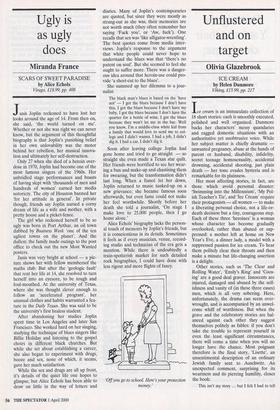Ugly is as ugly does
Miranda France
SCARS OF SWEET PARADISE by Alice Echols Virago, £18.99, pp. 408 Janis Joplin reckoned to have lost her looks around the age of 14. From then on, she said, 'the world turned on me'. Whether or not she was right we can never know, but the argument of this thoughtful biography is that Joplin's punishing belief in her own unlovability was the motor behind her rebellion, her musical innova- tion and ultimately her self-destruction.
Only 27 when she died of a heroin over- dose in 1970, Joplin had become one of the most famous singers of the 1960s. Her unbridled stage performances and boasts of having slept with 'thousands of men and hundreds of women' earned her media notoriety. The city of Houston banned her `for her attitude in general'. In private though, friends say Joplin nursed a corny dream of life as a wife and mother, with a pretty house and a picket-fence.
The girl who reckoned herself to be so ugly was born in Port Arthur, an oil town dubbed by Business Week 'one of the ten ugliest towns on the planet'. And the dullest: the family made outings to the post office to check out the new Most Wanted posters.
Janis was very bright at school — a pic- ture shows her with fellow membersof the maths club. But after the 'geologic fault' that rent her life at 14, she resolved to turn herself into an eyesore, to be tough and foul-mouthed. At the university of Texas, where she was thought clever enough to follow an 'accelerated program', her unusual clothes and habits warranted a fea- ture in the Daily Texan. She was said to be the university's first braless student.
After abandoning her studies Joplin spent time in Los Angeles and later San Francisco. She worked hard on her singing, studying the technique of blues singers like Billie Holiday and listening to the gospel choirs in different black churches. But while she set about establishing a career, she also began to experiment with drugs, booze and sex, none of which, it seems, gave her much satisfaction.
While the sex and drugs are all up front, it's details of the quiet life one hopes to glimpse, but Alice Echols has been able to draw on little in the way of letters and diaries. Many of Joplin's contemporaries are quoted, but since they were mostly as strung-out as she was, their memories are not worth much (they often remember her saying 'Fuck you', or `Aw, fuck'). One recalls that sex was 'like alligator-wrestling'. The best quotes come from media inter- views. Joplin's response to the argument that white people could never hope to understand the blues was that 'there's no patent on soul'. But she seemed to feel she ought to suffer more. There was a danger- ous idea around that heroin-use could pro- vide 'a short-cut to the blues'.
She summed up her dilemma to a jour- nalist: The black man's blues is based on the 'have not' — I got the blues because I don't have this, I got the blues because I don't have my baby, I got the blues because I don't have the quarter for a bottle of wine, I got the blues because they won't let me in the bar. Well you know, I'm a middle-class white kid from a family that would love to send me to col- lege and I didn't wanna. I had a job, I didn't dig it. I had a car, I didn't dig it.
Soon after leaving college Joplin had gone home and tried to go straight — so straight she even made a Texan star quilt. Her friends were horrified to see her wear- ing a bun and make-up and chastising them for swearing, but the transformation didn't last long. When a fiancé let her down, Joplin returned to music tanked-up on a new grievance; she became famous soon afterwards, but even fame could not make her feel worthwhile. Shortly before her death she told a journalist, 'On stage I make love to 25,000 people, then I go home alone.'
Alice Echols' biography lacks the person- al touch of memoirs by Joplin's friends, but it is conscientious in its details. Sometimes it feels as if every musician, venue, record- ing studio and technician of the era gets a mention. While there is undoubtedly a train-spotterish market for such detailed rock biographies, I could have done with less rigour and more flights of fancy.
`Off you go to school. Here's your protection money.'






















































































 Previous page
Previous page